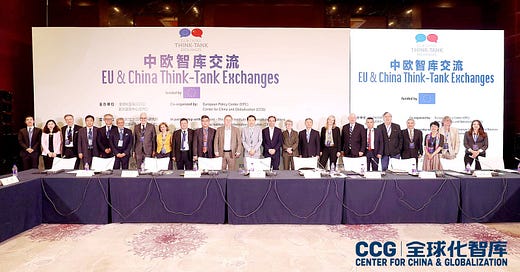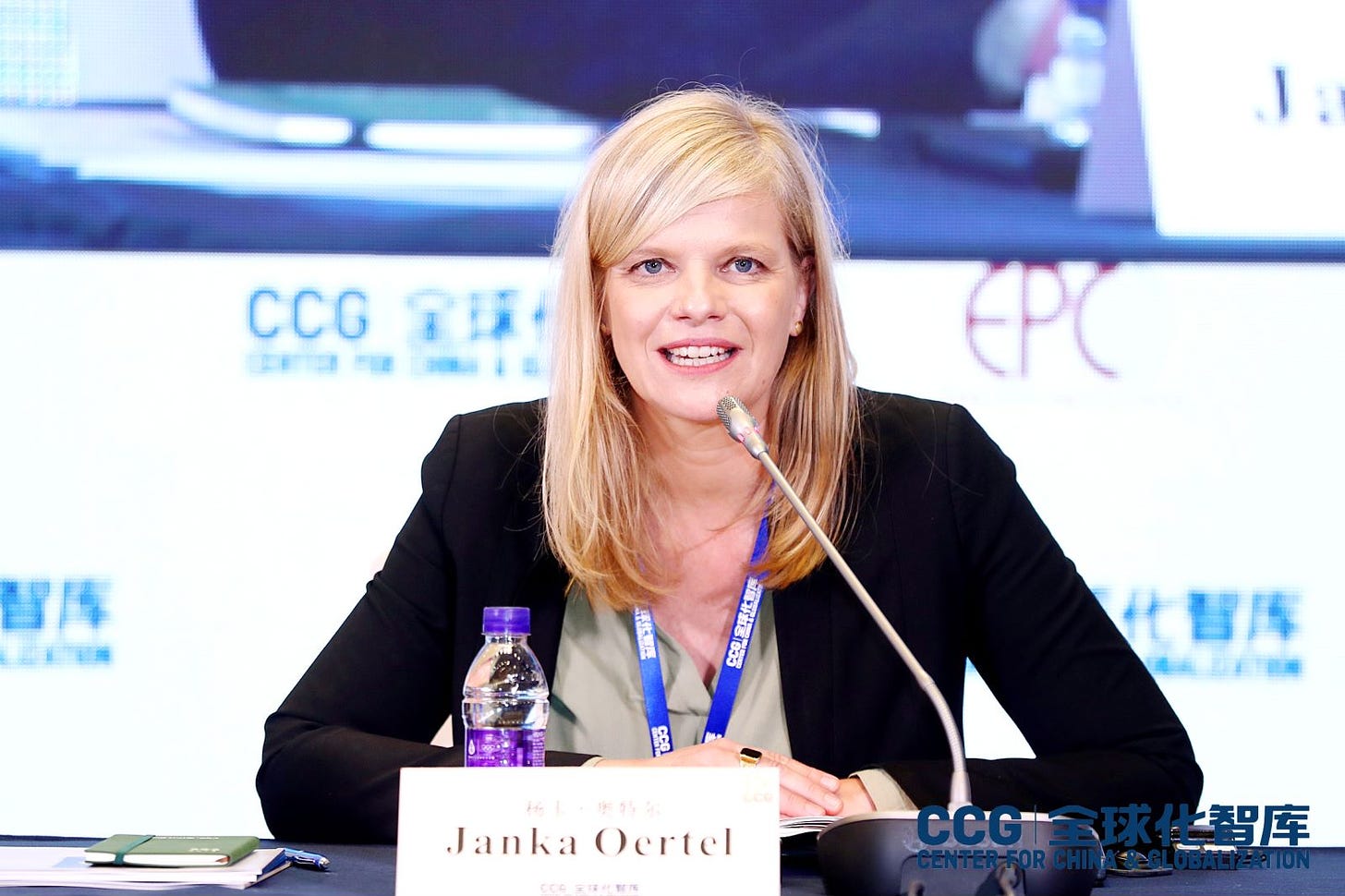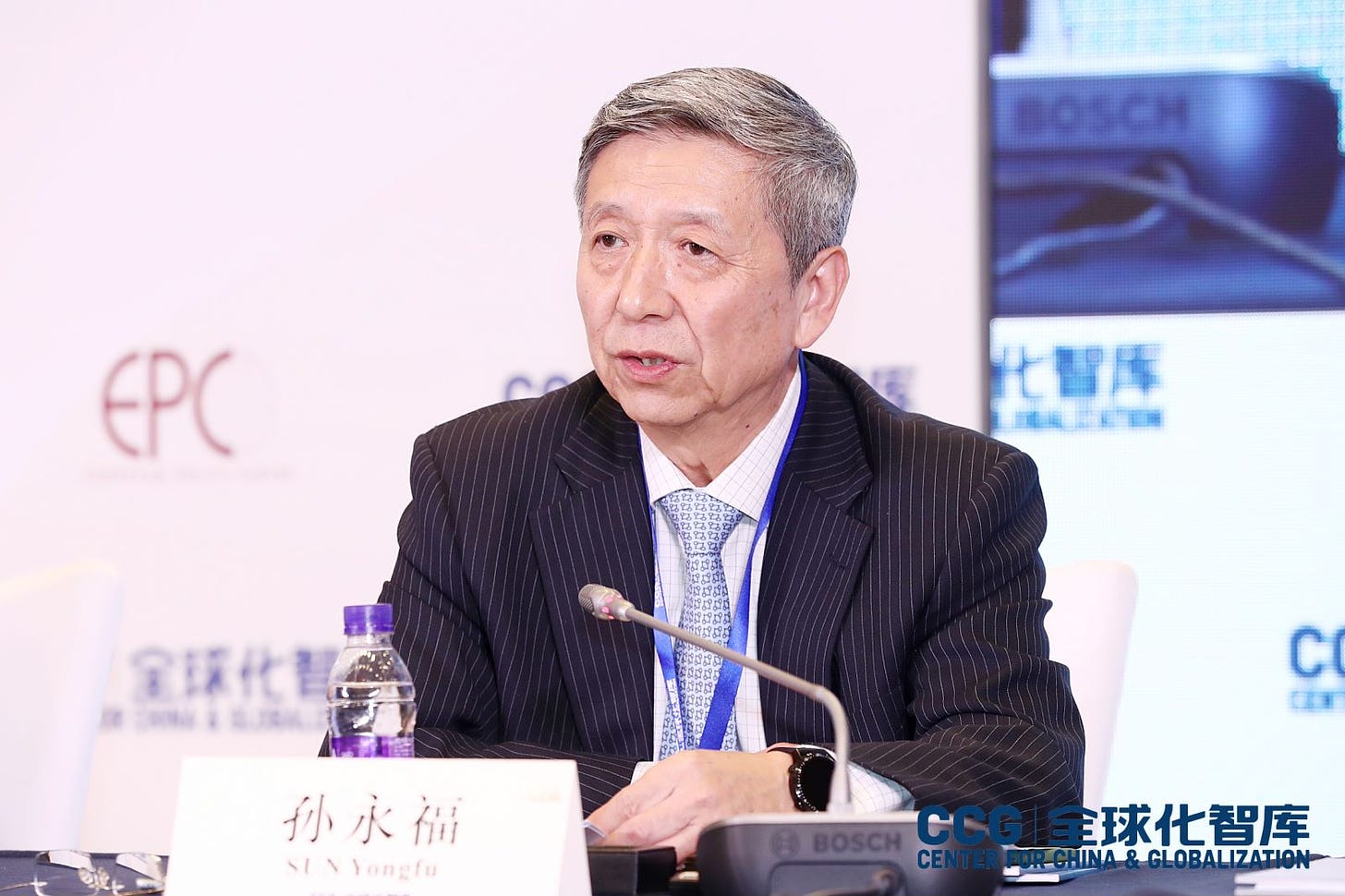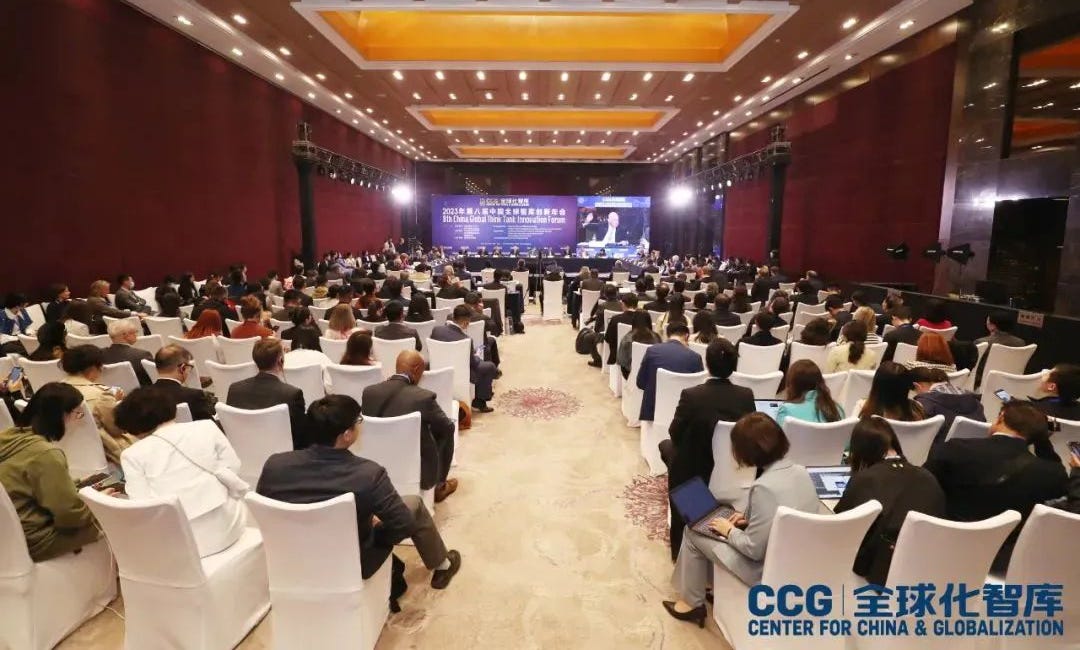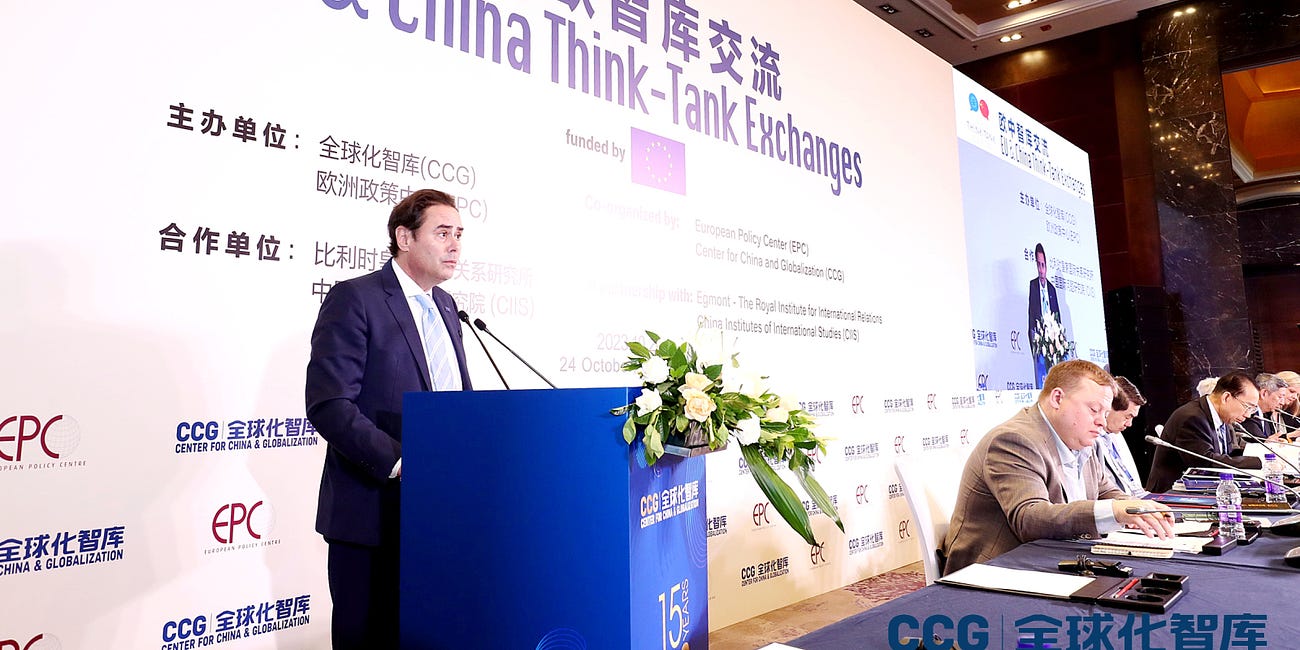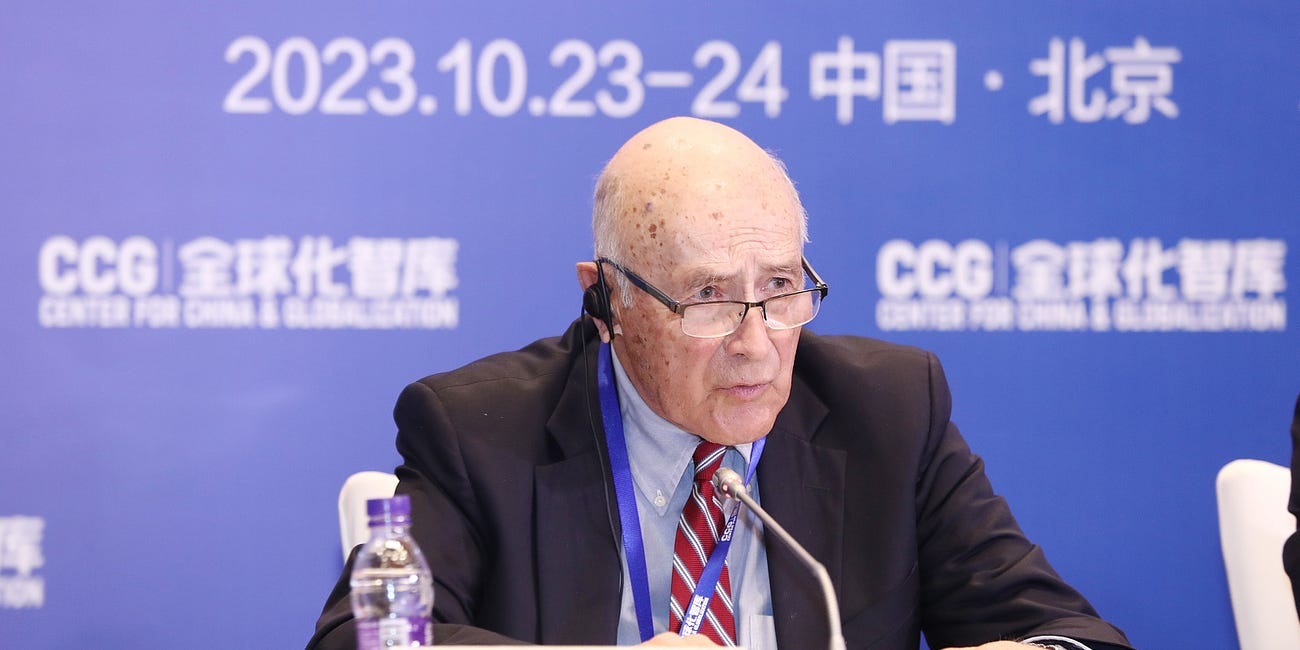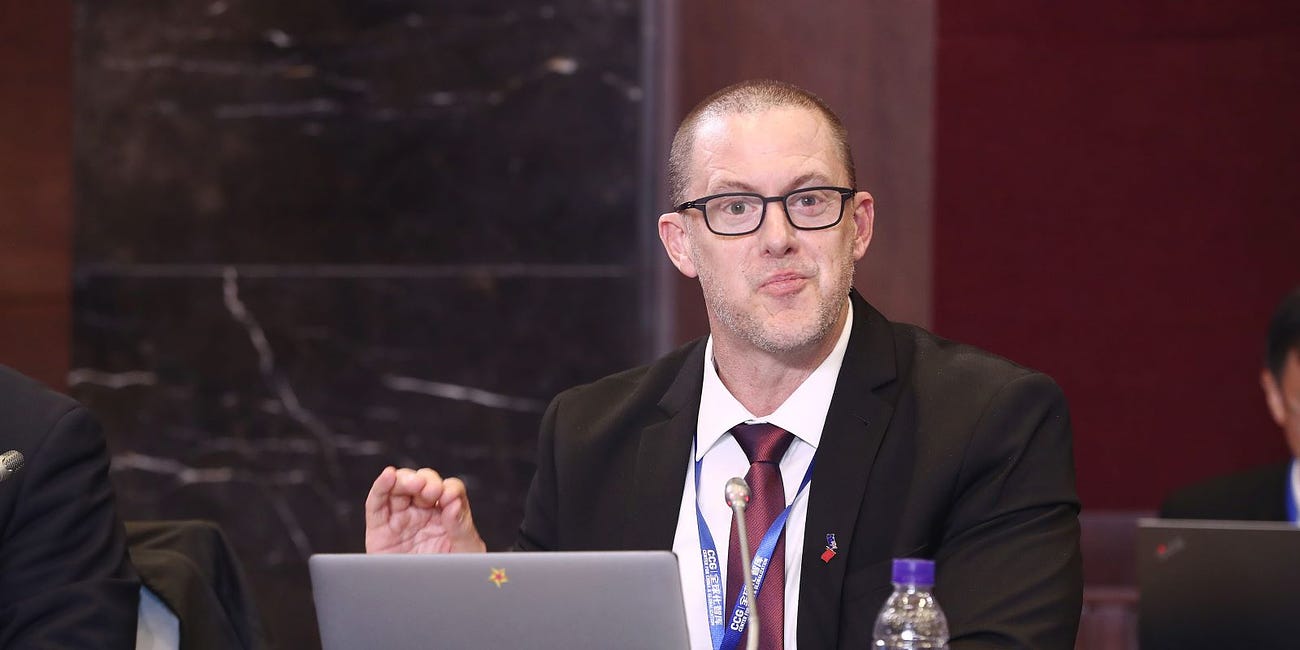Transcript Part One: Top China, EU experts on "EU-China Relations: Review and Outlook" in Beijing
Fabien Zuleeg, Cui Hongjian, Janka Oertel, Sun Yongfu, Francoise Nicolas, and Dai Changzheng at EU & China Think Tank Exchanges on Oct. 24
The following is the transcript of the discussion on "EU-China Relations: Review and Outlook" at the October 24, 2023, EU & China Think Tank Exchanges, co-organized by the European Policy Centre (EPC) and the Center for China and Globalization (CCG) and funded by the European Union, in Beijing.
This discussion followed the speeches by Henry Huiyao Wang, founder and President of the CCG, Amb. Jorge Toledo Albiñana, EU Ambassador to China, and Amb. WU Hailong, President of China Public Diplomacy Association and former Chinese Assistant Foreign Minister and Ambassador to the EU.
[The audio recording of this transcript starts at 1:26:30 and ends at 2:28:15]
[The video recording of this transcript, available on YouTube, starts at 0:50:29 and ends at 1:54:55. It was also broadcast online by CCG and remains available in China.]
This discussion was moderated by Ricardo Borges de Castro, Associate Director and Head of the Europe in the World Programme at the European Policy Centre.
This transcript covers six speakers:
Dr. Fabian Zuleeg, CEO and Chief Economist of the European Policy Centre
Cui Hongjian, Senior Fellow of CCG and Professor at the Institute for Advanced Regional and Global Governance of the Beijing Foreign Studies University.
Janka Oertel, Director of the Asia Program and Senior Policy Fellow at the European Council on Foreign Relations.
Sun Yongfu, Senior Fellow of CCG and former Director-General of the Europe Department of China’s Ministry of Commerce
Francoise Nicolas, Senior Research Fellow at the French Institute of International Relations and Head of the Center for Asian Studies
Dai Changzheng, CCG Senior Fellow and Dean of the School of International Relations at UIBE
This transcript is transcribed by CCG from the audio and video recordings and may contain errors. It hasn’t been reviewed by the speakers.
After the six speeches, others also spoke. That transcript will be shared later.
Dr. Fabien Zuleeg, Chief Executive and Chief Economist of the European Policy Centre
Thank you very much. I'm very happy to be here. Thank you also from my perspective to CCG and to Henry in particular. We've had many activities online, but it is very nice to be able to do this in person again. So very happy to have this discussion.
These are challenging times. I think we've already heard some of that in the opening remarks. And in that context, it's even more important to have open and Frank exchanges and to enhance mutual understanding. My thanks again to CCG but also to Egmont and CIIS and all the think tanks who are participating in these exchanges. And I also want to thank the EU Delegation for the funding provided and the support they have given us. I also want to thank the ambassadors for their very frank opening statements. I think it's a very useful start for this debate. And in the context of open exchanges, I also want to note that it is disappointing that Mikko Huotari, who is Senior Adviser with EPC and head of MERCIS didn't receive a visa to participate. We think it's important that all think tanks can be able to have these exchanges, and we hope that is possible in the future.
Turning to EU-China relations, this is a difficult moment, especially since Russia's war of aggression against Ukraine. And for many, China's perceived political support for Russia is a major issue. But we also see that the frictions between China and the US are spilling over into the EU-China relationship. I want to emphasize that there are many areas where the EU and the US diverge. But when it comes to Ukraine, I want to make it very clear that from my perspective, this is not coercion by the us but this is a direct security threat to the European Union. And I think there's a very broad consensus that we have to support Ukraine to resist and to preserve its territorial integrity in line with international law.
I want to look a bit into the areas of competition and cooperation following the discussion we had yesterday. I'll try to keep it brief, but I think there are a number of areas of discussion, and I want to start with what has been named Europe’s strategic autonomy or in some iterations, now, economic security. I want to start with saying this is an old concept. This is not something which has only been on the agenda very recently. Energy security, for example, has been around for a long time. I would also want to emphasize that this is not something which only relates to China. Certainly, the move towards strategic autonomy was driven also by Trump. And certainly, the concerns around Russia and dependence on Russian gas have been around for a long time.
There are a number of new measures which are being considered in that context from anti coercion to better managing supply chains, to investment screening, and a number of other issues we could talk about. But from my perspective, I think it has to be clear that these are not protectionist mechanisms. These are not part of a protectionist agenda, but these are about addressing Europe's vulnerabilities in a world of weaponized interdependence. And I think that is the context in which I would see those measures. Clearly, these will distort competition. I think it is inevitable. But in many ways, I would say the European Union is doing in those areas what many countries have been doing for a very long time. So these are not necessarily, very radically different.
We also have a number of measures being put into place to manage the transformations, the transitions, which are necessary - the transition towards sustainability and climate action. Again, these are controversial because they are going to distort the free exchange. Certainly, the Carbon Border Adjustment Mechanism (CBAM), for example, has been mentioned as an issue, not only in the relationship with China, but with many countries. Industrial policy measures which have been taken to drive these transformations. But again, these, in my view, are not aimed at protectionism. They are aimed at achieving the global transformations we need. And in those areas, I think there is also scope for global cooperation and global governance.
Further area, which was also mentioned, is fair competition. And this is a different issue than the security issue. I think it is a discussion about how fair the competition is between China and the EU -- the investigations which are there around electric vehicles, the discussions around steel in that context. I would very much emphasize that these are investigations will see what evidence there is for distortions to competition. But in this context, I would emphasize that it is actually, in my view, a benefit, not only to the European Union, but also to our trading partners, to have these measures at the European level, because if we have measures at the European level, we have to have a common legal framework which is commonly enforceable, which is transparent, and which has to be based on evidence, given that it is challengeable also in the courts of law. So I think this is actually a benefit rather than a difficulty.
All of that raises the question of how do we cooperate in this context on global challenges? It was emphasized also yesterday, but I want to emphasize it again that clearly, we all collectively have to deal with the major global challenge of climate change. It is not an option, but it is a necessity for the continuation of humanity. And in that context, we have to find ways of overcoming the difficulties and dealing with the trade-offs, the transition costs and the distributional consequences of the actions which need to be taken. I think it's very important to think about how we can align incentives, in particular, for companies, to make sure that we are driving that transition.
So what does all that mean for EU-China relations? I think in the economic field, we will see a continuing discussion around fair competition. We will also have opportunities for cooperation, especially with regard to the global challenges. I think the one area where we can think whether it is possible to make significant progress is on common global governance, on the multilateral system, which is under pressure. So this is very much a challenge. But I think what is very important is that we continue to have an open dialogue, that we continue to foster mutual understanding. So I'm very happy to be here and to have this discussion with think tank colleagues from China and from the rest of the world. Thank you very much.
Cui Hongjian, CCG Senior Fellow and Professor at the Institute of Regional and Global Governance at Beijing Foreign Studies University
Thank you, Chair and all of the guests. Let me take a few seconds to express some more emotional feelings, especially after some difficult time for face-to-face communication. It's my great pleasure here to meet with some old friends again, Fabian was under shutdown along with some others. So I think it gives strong confidence for me, no matter what happened for the global situation, for regional situation, and for China-EU relations, I still believe strongly that this communication between think tanks, this people-to-people contact is always the most valuable thing we need to do.
If we look back or ahead, what people are mentioning today is the crossroads for China-EU relations. And to some degree, it reflects the reality. If we look at what happened for this keynote speech, both ambassadors, they do have very, very clear and candid understanding and attitude towards the bilateral relations..So I think that's also give a more space, more reasons for think tanks, for peoples to find out, more reason for us to have more communication and to deal with the situation.
I want to just have some points. If we take in more consideration on the yesterday and tomorrow of China-EU relations, I think firstly, we need to understand, maybe to approach. One of them is we need to go inside of these relations to understand what change took place in the past years. And also we need to understand logic behind some policies or some regulations from both sides. And then we need to go beyond this situation realities. We need to look for some more reliable solutions for this relations, especially when it is at a crossroads.
But firstly, we can find disagreement between two sides now on this multi-faceted description or concept from the European Union side on China. I think, from the Chinese side, the question is, once it is established in concept, as a partner, competitor, and rival, it would be practiced in policy and even in actions. I think very obvious case is about the CAI as we know, once it is in the logic of partner, or even the competition. I think now we will have this CAI now. But unfortunately, as we know, now it has been frozen in European Parliament. It looks like the European side has been coping with this issue in the logic of rivalries. So I think it gives a very, very big question for both sides, for policymakers, for scholars: how could we keep the balance of the policy? I think one of the big risks for this multi-faceted concept from the European side on China is: it's easy to reach an imbalanced situation between all of three policy approaches.
Another, I think, very important issue is geopolitical coexistence between China and the European Union. There may be the new dimensions for these relations, not only economy and trade, not only people-to-people. And because of the Ukrainian crisis or even Israel-Palestine conflict, both sides need to have some more geopolitical exchange. So China is a natural competitor or rival with European Union, or China would be a flexible choice for the European Union to have some strategic trust.
As we know, just like Fabian and also the European Union Ambassador here mentioned, the European side is not so satisfied with the attitude from China on the Ukrainian crisis, and especially its relations with Russia. But I think maybe for China, the most important thing is, once it is not the current situation, especially in the relations between China and Russia, maybe the situation will be worse. Maybe the Russian side, will go far away from the current situation. So how could we try to keep the strategic stability? I think it's not only the consideration for China. It should be also a major consideration for the European side. And beyond all of these difficult issues, I think now we need to try to find some solution going beyond the difficult situation or reality. For example, how could China and European Union side, if we are wise enough, to find out maybe long-term solutions to crisis management or uncertainty management?
For China and the European Union side, it looks like recently, we are in more or more uncertainties like anti-subsidies investigations, and less and less mutual trust on some issues, and mostly from a third party. For example, once there are close relations between China and Russia, there will be some worries or suspicions from the European side. At the same time, once there are some more coordination of policy between Washington and Brussels, there will be also more concern from Beijing. So how could we try to go beyond this twist of the relations? How could we find a more indigenous dynamics from China-EU relations? If we look at the economical twist, yes, it looks like there are some more barriers from both sides, frankly, a kind of over regulations. But how could we try to stop these tendencies? How could we try to convince policymakers from both sides that once we have some more favorable environment for both China and European companies and enterprises, there will be more confidence from the market from both sides with each other.
And finally, I think, not only we need to deal with this influence from a third party, but also we need to try to find out the real pragmatic solutions to manage these relations. Of course, I think we need to make clear the destination for this management of uncertainties between two sides. We need to try to find out more cooperative, not competitive relations. And if we look at the logo of this conference, the interesting thing is, the logo looks like a boxing club. So it gives us a message. It looks like both China and European sides, they are going to a boxing field. But of course, we can find it's also a charter box, which means that we need to have some more communication to avoid going to the boxing field. I should stop here. Thank you.
Janka Oertel, Director of Asia Program, and Senior Policy Fellow at European Council on Foreign Relations
Thank you, Ricardo. And thank you for the kind invitation. It's a great pleasure to be here in Beijing again. And please allow me to also stay within the spirit of the two ambassadors’ remarks with regard to the candidness that I would like to engage in.
Let me start by reiterating what Fabian has mentioned, that it is very unfortunate that the member of our delegation was not receiving a visa. I think that is not in the spirit of dialogue. And I do think that Mikko Huotari from MERICS belongs at this table to have a really good conversation. And it is a very unfortunate situation, particularly for us in Berlin, if some of us can and some of us cannot go to have direct face-to-face conversation. I just wanted to point that out at the beginning
On the state of EU-China relations, before we look out, I do think it is really important to be honest about the fact that it is grim. We're not in a state where we can sugar-coat what is happening. And I would even say 2024 is likely to get worse. So for us, I think the stopping the deterioration of the relationship must be the key goal at the moment. But that is, I think, the aim, the kind of humble aim that we can have for the next year: not to talk much about where things can improve, but about stopping the current trajectory.
The list of grievances on the European side is long. I do think that it kind of corresponds with the list of grievances on the Chinese side. But obviously, as Fabian has mentioned, market distortions are a huge issue for us at the European side. A level playing field is something that the European side keeps bringing up, but quite frankly, is not in the interest of China right now, because it is not in china's favor if the a leval playing field would actually exist. Therefore, I think maybe we have to give up on the idea that it will ever exist again, or that it ever has existed.
There are developments within China that are obviously very troubling for the European business community. And I do think it is important to underscore that the main movement in the change of the European relationship with China and the development of the holy trinity of the partner, competitor and rival, started within the German business community. This is not some lofty idea of diplomats or weird think tankers. It was the concern of German industry that has started bringing this concept to the table, and that has kind of put the rivalry at the center and the competition at the center of the relationship.
And I do think that this is absolutely key for the relationship with regard to China and Russia, which is, I think, the absolutely central development of the last two years in EU-China relations. For Europeans, it increasingly feels that geopolitical turmoil comes at high costs for Europe -- not just high energy prices and inflation, but also migration pressures and huge investments in the defense sector, but that these developments are actually beneficial for China. And this puts the trajectory of the relationship at a very complicated outset. For us, it is not about the long term right now. And I do think that this is also important to underscore. This is about a short-term crisis that Europe is facing. Europe has a war at its borders that is challenging it at its very core and at its very heart. And the fact that China-Russia relations over the course of the last two years have deepened is obviously a smack in the face for EU-China relations. It is problematic for Europeans to watch a Belt and Road Forum unfold, in which President Putin is received with great honors. These pictures are being viewed in Europe on TV and are seen with great disdain, because this is currently the largest challenge to our peace and prosperity in Europe.
The pressure on Europe at the moment is enormously high. This is the largest security crisis that we have faced. And now we have the Israel-Gaza crisis on top of things, with the aggressions of Hamas challenging further our security environment and further enhancing migration pressures. Right now, I think the world would really need different signals than a quasi neutrality that is not neutrality, but that deciding with the aggressors in two conflicts that are of key importance to Europe.
So realistically, there's not much of an expectation that we can find common ground right now. I think even on climate change, which is mentioned often, COP28 will have to show how much common ground there can actually be found. For Europe right now. This is a time for derisking. It is a time for derisking because the world around us has changed very much not in our favor. In practice, that puts us in three areas in key challenges: the import area, the export area, and market dependencies.
On the import front, I think we're making good progress when it comes to critical raw materials and new partnerships when it comes to diversifying from where goods are from. I do think that the EU is on the right track. On exports it’s going to be more difficult, and the most challenging for the German economy is going to be the market dependence here on the Chinese market. But quite frankly, the current developments within the Chinese economy are helping to reduce that dependency for the German side.
Dialogue, maybe to kind of be clear about that, is important, but not just to achieve dialogue for dialogue’s sake and to have a kind of cooperation idea. It is important to manage our competition. But between think tanks, I think I expect more of this form of dialogue. So maybe I will end with a few research questions that I'm actually interested in, in comparison to all the things that we can throw at each other in terms of the list of grievances. I want to know where the Chinese economy is headed, and I would really like to know what's the what Cui Hongjian is thinking about that, and where things are going, and where things are moving. I want to know what the concrete room for cooperation creating physical space in developing countries for the green transition, and what Chinese ideas for that are, where Chinese solutions for that would be, so that we can discuss them and that we can talk about them very concretely. I would also like to discuss whether competition is not actually better for climate change than cooperation. If we actually really compete and race to the top about who is faster in implementing decarbonization and green technologies, maybe that's even better. Let's discuss that. What is the state and the time frame of RMB internationalization? Where are we on that? And what does this mean for Europe? I would love to discuss more about that. How can we maintain peace and stability in Indo-Pacific? And what role for Europe does China see in that? And what are our respective expectations of 2025 and the post-US election time frame that, I think, sends shivers down European diplomats and policymakers’ spines when they even think about it. And I do think that a really frank exchange about that with our Chinese counterparts would be helpful.
I think having a real conversation about this is very valuable, and this is why I'm here, and I think this is hopefully what we can engage in. Thank you.
SUN Yongfu, CCG Senior Fellow and former Director-General of MOFCOM Department of European Affairs
[Originally delivered in Chinese and translated for the audience's convenience.]
很高兴参加今天的对话,我觉得这样坦率对话对双方都是有利的,我想集中谈一谈中欧间的务实合作也就是经贸合作,谈三方面的问题。
第一,欧盟直到2019年一直是中国最重要的贸易伙伴,延续16年是中国第一大贸易伙伴。2020年被东盟超出,这里有英国脱欧的因素,还有美国加征关税使一些在中国的制造转移到东盟,带动了贸易转移。因此,目前欧盟是中国第二大贸易伙伴,东盟转为中国第一大贸易伙伴。
应该说,过去很多年,中欧经贸关系一直是双边各类关系的稳定器和压舱石,但是目前的状态令人担忧。刚才提到了德国在中欧贸易中的重要性,德国事实上在中欧贸易中占大概三分之一的份额,一直是中欧贸易中最重要的贸易伙伴。大家知道,德国的汽车工业是最强的,中国一直是德国三大汽车企业在全球的第一大消费市场,这对欧洲、对德国是非常重要的。因此,取代中国这样一个巨大的市场对于欧洲出口商来说不是一件好事。
第二,中欧经贸合作越来越受到双边政治关系、意识形态、人权因素的影响,当然这里面也有很强的美国因素对中欧经贸合作所产生的负面的影响。在前面的发言中,两位大使都谈到了欧盟对中国的定位:“合作伙伴、竞争者和制度性的对手”。给我感觉越来越多的是,从欧洲方面讨论制度性竞争对手的时间和机率越来越多,而在谈到合作伙伴以及合作领域的时候强调的越来越少。强调矛盾多,强调合作少,对双边的务实合作产生了非常负面的影响。
第三,我想举一些数字说明目前中欧经贸务实合作到了一个非常危险的境地。2023年1-9月份,最新数据,从中方统计双边经贸合作进出口加起来是5942亿美元,下降了7.7%,这在中欧经贸合作的历史上,就我所知的三十几年来是从来没有过的,即使在去年双边贸易还是微弱增长的,虽然有疫情因素。去年双边贸易是8473亿美元,是有增长的,而现在是1-9月份7.7%的负增长,这是我在商务部做欧洲司长12年来从来没有见到过的,所以,我觉得这应该引起双边政府和企业的高度重视。
其中,中国对欧盟的出口3822亿美元,下降了10.6%,中方从欧洲的进口2120亿美元,下降了2.1%,大家可以看到我们出口下滑的速度高于进口下滑的速度,进口下滑只有2.1%,出口下滑10.6%。中方顺差1702亿美元,顺差下降了19.6%,因此,从双边贸易来讲,总体下滑,但是顺差下滑速度接近20%,也就是说这种贸易结构越来越朝着向有利于欧洲出口的方向在进展。
从投资角度看,今年1-9月份欧洲对中国的投资非金融领域92.1亿美元,增长了8.9%,这是商务部的数字,中国对欧洲的投资是59.3亿美元,增长了13.8%。所以,从投资的角度还是有增长的,和贸易形成了鲜明的对比。
无论如何,贸易的这种负增长应该引起我们高度的重视,贸易的负增长无论对中国还是对欧洲都不是一件好事,无论从哪个角度看。
我看到前不久已经中断好几年的经贸高层对话(HED)又重启了,我觉得这种对话有利于双边的经贸合作。前不久的HED取得了不少的成果,对于双边市场进一步的开放,对于欧方特别是一些具体的关注都进行了认真的交流和规划,我觉得对未来经贸的发展只有好处。中国也表示要继续改革开放,更多的进口欧洲的产品。我觉得制造业的合作,在“一带一路”峰会上中国宣布的制造业全面开放也会为欧洲企业进一步进入中国提供更多的合作机遇。
据我所知,今年年底,中欧双方还要举行双边的领导人会晤。我总的感觉,最高层的这种对话交流对于双边的务实合作,加强双边的进一步理解是非常有利的。我觉得经贸合作、发展和增长对双方只有好事,“去风险”并不意味着去合作。所以,双方不应该过多强调“制度性对手”,而应该加强合作,扩大合作领域,造福双边的人民。我们可能的合作领域应该说还是很多的,特别是应对全球环境和气候挑战,在数字经济、绿色能源、低碳、光伏风电、电池等很多领域都有合作的可能。我认为,中国高质量的发展和欧盟经贸的恢复性增长都有赖于双边经贸稳定的发展。我希望只要双方相向而行,经贸合作将有可能重回健康发展的轨道,当然这需要双方的共同努力,谢谢大家!
I'm delighted to participate in today's dialogue, and I believe that open and frank discussions are beneficial for both sides. I'd like to focus on practical cooperation between China and Europe, particularly in the economic and trade sectors, and address three key points.
Firstly, until 2019, the EU had been Chinas most significant trading partner for 16 consecutive years. In 2020, the ASEAN surpassed the EU, influenced by factors such as Brexit and the United States' imposition of tariffs, leading to a shift in trade patterns. Consequently, the EU currently stands as China's second-largest trading partner, with ASEAN assuming the position of the largest.
Over the past few years, China-EU economic and trade relations have served as a stabilizing force and a cornerstone in various bilateral connections. However, the current situation is a cause for concern. As mentioned earlier, Germany plays a pivotal role in China-EU trade, contributing to approximately one-third of the trade volume. Germany's robust automotive industry is well-recognized, and China has consistently been the largest global consumer market for Germany's top three automotive companies. This holds immense significance for Europe and Germany. Therefore, replacing such a colossal market as China would not be advantageous for European exporters.
Secondly, China-EU economic and trade cooperation is becoming more and more influenced by bilateral political relations, ideological factors, and human rights considerations. Of course, there is also a significant American factor contributing negatively to China-EU economic and trade cooperation. In the earlier discussions, both ambassadors mentioned the EU's characterization of China as a "partner, competitor, and systemic rival." I've noticed that there is an increasing focus from the European side on the systemic rivalry aspect, while the emphasis on partnership and cooperation is dwindling. This emphasis on contradictions over cooperation has had a profoundly adverse impact on practical bilateral cooperation.
Thirdly, I'd like to share some statistics to highlight the current precarious state of China-EU economic and trade cooperation. In the first nine months of 2023, according to the latest data, the combined bilateral trade volume, as per Chinese statistics, amounted to $594.2 billion, reflecting a 7.7% decline. To the best of my knowledge, such a decline has never occurred in the history of China-EU economic and trade cooperation over the past three decades. Even though pandemic-related factors played a role, last year witnessed a modest growth in bilateral trade. In 2022, the bilateral trade volume reached $847.3 billion, showing an increase. However, in the first nine months of 2023, we are witnessing a 7.7% contraction, something unprecedented during my 12 years as the Director-General for European Affairs at the Ministry of Commerce. Therefore, I believe this should be a matter of paramount concern for both governments and businesses.
Within this context, China's exports to the European Union amounted to $382.2 billion, marking a 10.6% decrease, while China's imports from Europe totaled $212 billion, experiencing a 2.1% decline. As you can see, the rate of decline in our exports is higher than that of our imports, with imports decreasing by only 2.1% compared to a 10.6% decline in exports. China's trade surplus with the EU stood at $170.2 billion, marking a 19.6% decrease. Thus, while the overall bilateral trade has declined, the rate of decline in the trade surplus is close to 20%. This indicates that the trade structure is increasingly favoring European exports.
From an investment perspective, in the first nine months of this year, non-financial investments from Europe to China amounted to $9.21 billion, showing an increase of 8.9%, as per data from the Ministry of Commerce. On the other hand, Chinese investments in Europe reached $5.93 billion, marking a growth of 13.8%. Therefore, from an investment standpoint, there is a notable contrast when compared to the situation in trade.
I've observed that the High-Level Economic and Trade Dialogue (HED), which had been on hold for several years, has restarted recently. I believe that such dialogues are conducive to bilateral economic and trade cooperation. The recent HED has achieved many results, including discussions and planning for further market opening and addressing specific European concerns. I believe this bodes well for future economic and trade developments. China has also expressed its commitment to continue reforms and further open its market to import more European products. I believe that cooperation in the manufacturing sector, along with China's comprehensive manufacturing sector opening announced during the Belt and Road Summit, will provide more opportunities for European companies to enter the Chinese market.
To my knowledge, both China and the EU are planning to hold a bilateral summit at the end of this year. In my overall perception, this kind of high-level dialogue and exchange is highly beneficial for practical bilateral cooperation and strengthening mutual understanding. I believe that economic and trade cooperation, development, and growth are beneficial for both parties. Emphasizing "risk reduction" should not be interpreted as reducing cooperation. Therefore, both sides should not overly emphasize being "systemic rivals" but rather should strengthen cooperation, expand collaboration areas, and bring benefits to the people of both sides. There are still many potential areas for cooperation, especially in addressing global environmental and climate challenges. Opportunities for collaboration exist in numerous fields such as the digital economy, green energy, low-carbon initiatives, photovoltaics, wind power, batteries, and more. I believe that China's high-quality development and the EU's recovery-oriented economic and trade growth rely on the stable development of bilateral economic and trade relations. As long as both sides move towards each other, economic and trade cooperation may have the chance to return to a healthy development track. Of course, this requires joint efforts from both sides. Thank you, everyone!
Francoise Nicolas,Director of Center for Asian Studies, French Institute of International Relations (ifri)
Thank you, Ricardo. First of all, let me thank the organizers for having me here. It's a great pleasure to be back in Beijing, it's been four years since COVID, so I'm quite happy to be here.
First thing, I'm afraid I will not disappoint Ambassador Wu, and I will tend to sound rather negative, as Europeans usually are, apparently. No, I do agree with Janka that if we look at the EU-China relations for 2024, what can be expected is continuation of very tense relations. And I think there's no point in trying to sugar-coat or put on the rosy-colored glasses. The situation is not good. Let's face it. And if we exclusively try to look at the bright side of things, we may miss a number of things which are rather negative.
So let me highlight perhaps two areas where I see major difficulties between the two parties. The first is, of course, trade, and the persistence of unbalanced trade. On this specific point, let me get things straight right from the start: I am not against unbalanced trade. If the trade is unbalanced between the EU and China, it should not be exclusively blamed on China. If the trade is unbalanced, it may be simply because China is more competitive than the EU. So I'm all in favor of competition. I'm not in favor of managed trade. So I strongly disagree with those who would like to impose balanced trade. This would be like managed trade, and this is not something that is desirable. I think that we should not set the score of the match even before the game starts, which is exactly what managed trade is doing. So that's not the point. But the point is to ensure that the competition can develop freely.
So what we are looking for is fair competition, fair trade, and for that, we do not want any distortions. And this is exactly what the EU was trying to do with the anti-subsidy investigation that it has launched recently against Chinese exports of electric vehicles. The point is simply to make sure that there are no distortions. And so the investigation is about checking whether the electric vehicles benefit from illegal subsidization, and the whether, on top of that, this subsidization causes or threatens to cause economic injury to EU producers. That's the point: just to make sure that the competition is fair, period.
And on this specific point, I think that the the Europeans have gone through a former experience, former episode of a similar nature in the past, and that was the all the story and the episode about the solar panels. So we know exactly what the the other party may gain and what we may lose with subsidies granted to some productions. So it is very unlikely that the investigation will be withdrawn. First of all, because it is at the EU level that has been put; plus, because of this former experience with the solar panels, we will certainly stick to the investigation. So of course, this will create tensions with China. But I think that it should be very clear what the point of this investigation is. It's really about ensuring fair competition. It's not about protectionism of any kind. So it should be, it should be clear. But I'm not, I'm not sure that it is well understood on the other side. And this is why I stress this point forcefully. So that's one the first area where I see what potential frictions, tensions, not necessarily conflict - you know, let's not play on words. These are frictions, simply frictions, not, you know, fundamental conflicts.
And let me stress one major point here, which is that the EU-China relation is very different from the China-US relation. The EU perceives China very differently compared to the way the US perceives China. We do not perceive China as an existential threat. This is very different from the US position. And again, this is something I think is quite important that it has to be really well understood on the part of China. So we are not into a confrontational approach to China. And on this specific point, I think we we differ quite substantially from the US position.
The second area where I see a major problem is, of course, the war in Ukraine. Here there is a deep misunderstanding on the part of the EU about China's position. As far as I know, China is all in favor of national sovereignty, of territorial integrity. And in the case of the war in Ukraine, well, there has been a clear violation of international law. There has been a clear breach. And so this is why, on the part of the EU, we do not understand why China is taking the position it is taking: not calling a spade a spade. This is a war. And why is China still endearing to the Russian rhetoric about a special operation, about a provocation on the part of NATO? There has not been any provocation. I mean, in this story, there is an aggressor, which is Russia, and there is a victim, which is Ukraine. It's extremely clear. And so we do not understand why this vision is not shared by China, which, on the other hand, shares all the values that are encapsulated in the UN charter.
So this is something that that sets us apart. But I think it should be discussed more more openly, more candidly, so that we better understand what is the other side's position. But honestly, I personally don't quite understand why China is sticking to the position it is sticking to. So this is another major reason why I think that the EU-China relation in 2024 will remain rather tense, or even grim as Janka said.
Well, perhaps, if I want to end on a more optimistic note, perhaps not to be criticized for being all the time so negative, there is one definite area where there is scope for cooperation, and that it is something that is repeated over and over again, and this is climate change. Okay, fine. But on this specific point, I think that a major contribution of this discussion would be perhaps to come up with concrete actions that could be taken to push this cooperation on climate change ahead or forward. Everybody's talking about that, but I think it is very important to go beyond the rhetoric of “let's cooperate and climate change” to come up with very concrete suggestions of what could be done together between the EU and China on this specific issue. It may have to do with financing. It may have to do with, I don't know what, but let's come up with concrete proposals about what can be done together. Because we were just saying, climate change is an ideal area for cooperation. This is very nice, but let's walk the talk and give concrete suggestions. And I’ll appear on the more positive of notes.
Dai Changzheng, CCG Senior Fellow and Dean of the School of International Relations, at the University of International Business and Economics (UIBE) in Beijing
I should first express my thanks to President Wang Huiyao, who invited me to join in such a big event and such a roundtable.
Frankly speaking, we are now facing an increasingly fragmented world splitting international order. You see that two worlds going on, and the frictions, the economic and political competition between China and the US is becoming more serious. We are really facing a world that is never seen in 20 years.
Both China and the EU are the most important civilizations and the most critical players, are in regarding international political relations. I think there are more difficulties and problems emerging from the Sino-European relations, no doubt. But the most important thing is that we should look into why those situations happened.
I'm a scholar of political science and international relations. First of all, if we see the ongoing ongoing situation of Sino-European relations, we may find that the policy contradictions, controversial concepts, and policies are issued by the EU. Actually, this is from my perspective, this is the main reason why we feel confused with the policy of the EU toward China. For me, the three aspects of strategies toward China, the concept itself actually is very controversial. How we can balance rival, competitor, and partner? And what are the relationships between these three? In some aspect, you need China to be a partner. In economic and trade realm, you want China to be a competitor. In terms of security, in terms of political problems, you see China as the rival. How do we understand such contradictory concepts and policies? How can we divide such three concepts? Are they a level and a sub-level? This is for the scholars. And for common people, we do not understand how the EU stand its points.
So we may find many contradictory actions and policy practices. For example, China-EU now are both facing serious challenges economically. We need cooperation. We need to understand each other’s interest. However, anti-subsidy policies and anti-dumping investigations are initiated by the EU, which seriously harms these kinds of relationships. We need to increase trade. However, in terms of semiconductors, green products, and digital industry, the EU has practiced the policy of derisking China. On the one hand, the EU needs to express its stance to contact, to communicate with China. On other hand, practically, the EU actually continues launching policies of derisking China. And how can we understand the relationship between so-called dialogue, conversation, and derisking China?
As for Mr. Borrell’s speech in Peking University. On the one hand, Borrell said that we never intended to establish the so-called official relationship, a diplomatic relationship with Taiwan. However, the EU look at the policy of China towards Taiwan as a so-called coercive action. Whereas on the Chinese side, we see that this is obviously an interference with the domestic affairs in China. So these policies and the value points behind the policy themselves are controversial and obscure. It's hard to be understood. Okay, another, you know, political and economic issues.
This has created a very hard environment. Many international corporations’ headquarters have moved out of China. And more industries and businesses are skeptical about the future; they took a stand-by-and-look attitude. So both sides feel that we need to begin a dialogue. So in the second half of 2003, we see that more European side leaders come to China, and also China has taken proactive actions to initiate more communications and conversations with the European side. However, if we do not change such contradictory policies and viewpoints of values, then we cannot not build up our trust. So, as Borrell also said, we need trust, but mutual trust between the EU and China is deteriorating.
Of course, we know that the EU has its own difficulties and problems, for example, the pressure from the United States and the political and economic situation in the EU itself. So how can we resolve the contradictions between rivals in governance models, economic competition, and interest partnership? For a logical answer, as a professor and scholar, I cannot find the way of logical analysis.
So if we look at the future of Sino-EU relations in 2024, perhaps it’s grimmer than today’s situation. Of course, more negotiations, more conversations are still better. We need to take actions; we need to understand each other because we are two big civilizations, the most important players in today’s world. We have power, we have the capacity to change the world. I hope that we begin from both sides. China should recognize the stance, the interest, and the hope of the EU. And at the same time, the EU should understand more about China’s stance, China’s interests, and China's politics. So that's for my speech. Thank you very much. (Enditem)
[The video recording of this transcript, available on YouTube, starts at 50:29 and ends at 1:54:55. It was also broadcast online by CCG and remains available in China.]
Again, this transcript is transcribed by CCG from the audio and video recordings and may contain errors. It hasn’t been reviewed by the speakers. After the six speeches, others also spoke. That transcript will be shared later.

